TV
-
Tales from the Royal Wardrobe with Lucy Worsley, BBC Four, July 2014
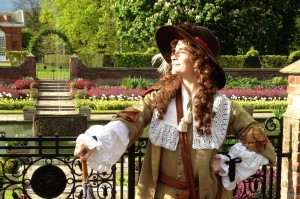 Today, few people’s clothes attract as much attention as the royal family’s, but this is not a modern-day Hello-magazine-inspired obsession. As Dr Lucy Worsley reveals, it’s always been this way. Exploring the royal wardrobes of our kings and queens over the last 400 years, Lucy shows that the royal wardrobe’s significance goes way beyond the cut and colour of the clothing. Royal fashion is and has always been regarded as ruler’s personal statement to his or her people. So most kings and queens have carefully choreographed every aspect of their wardrobe and, for those who have failed to do so, there have sometimes been calamitous consequences.
Today, few people’s clothes attract as much attention as the royal family’s, but this is not a modern-day Hello-magazine-inspired obsession. As Dr Lucy Worsley reveals, it’s always been this way. Exploring the royal wardrobes of our kings and queens over the last 400 years, Lucy shows that the royal wardrobe’s significance goes way beyond the cut and colour of the clothing. Royal fashion is and has always been regarded as ruler’s personal statement to his or her people. So most kings and queens have carefully choreographed every aspect of their wardrobe and, for those who have failed to do so, there have sometimes been calamitous consequences.Based on items from the 10,000 piece Royal Ceremonial Dress Collection at Hampton Court, you can read more about the show here and here, or watch a clip (getting dressed as Elizabeth I!) here.
-
The First Georgians, BBC Four series, May 2014
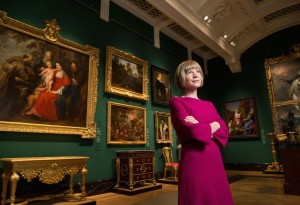 Our series The First Georgians, rather amazingly, kicked off with what turned out to be the fourth-most-watched programme in the history of BBC Four when the first episode was first broadcast in May 2014.
Our series The First Georgians, rather amazingly, kicked off with what turned out to be the fourth-most-watched programme in the history of BBC Four when the first episode was first broadcast in May 2014.The series tells the story of George I, George II and their family. In 1714, to prevent the crown falling into the hands of a Catholic, Britain shipped in a ready-made royal family from the small German state of Hanover. To get some insight into this risky experiment, I was given access to treasures from the Royal Collection as they were prepared for a new exhibition at the Queen’s Gallery, Buckingham Palace – providing a rare and personal view of George I and his feuding dynasty.
The Hanoverians arrived at a moment when Britain was changing fast. We looked at satire, gin-drinking, smallpox, the slave trade, the crushing of rebellion and the building of an empire – all at a time when Britain was embracing freedom of speech and modern cabinet government.
-
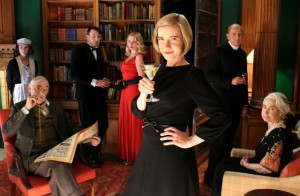
A Very British Murder, BBC Four series, September 2013
Murder: a dark, shameful deed, but also a very strange and very British obsession. How did this fixation develop? And what does it tell us about ourselves? In A Very British Murder, we explore the development of the strange new genre of art that grew out of the British love of crime. Starting with the notorious Radcliffe Highway Murders of 1911, and finishing with Graham Greene’s Brighton Rock just before World War Two, the series charts the birth and development of our interest in murder, and how it led to ballads, broadsides, puppet shows, melodrama, detective fiction and film – and those weird Victorian ceramic figurines depicting celebrated killers. Includes interviews with P.J. James, Agatha Christie’s grandson, and a slew of specialist historians.
-
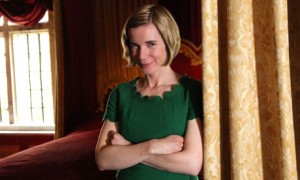
Tales from the Royal Bedchamber, BBC Four, July 2013
In the summer of 2013, all the world went mad for a royal baby. But this obsession with the birth of an heir to the throne has a very long history, and in fact – now that the monarchy wields less political power than it did – the stakes are much lower today. Tying in with the Hampton Court exhibition ‘Secrets of the Royal Bedchamber’, this one-off programme for BBC Four covered the history of what happened in the royal bed and bedchamber covered childbirth, politics, mistresses, procreation but also interior decoration and the history of design.
-
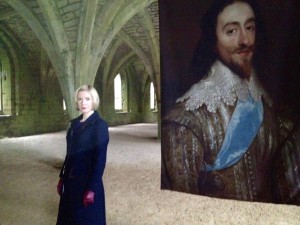
Fit to Rule? How Royal Illness Changed History, BBC Two series, April 2013
Were our kings and queens really fit to rule? This series for BBC 2 set out to answer that question – investigating the biological and psychological strengths and weaknesses of rulers from Henry VIII to Edward VIII. It also charts the decline of the power of the monarchy. Henry VIII is usually depicting as magnificent and god-like, and indeed some of his subjects believed that he had ‘two bodies’, one living breathing sleeping real-life body, and a second immaterial body that represented the nation. They also believed that he had some of the powers of God himself, such as being able to hear what they said in confession. Over the next four centuries, our kings and queens became more and more human – until we end up with Edward VIII, a man who believed that he simply wasn’t up to the job of being king, and resigned. Along we way we had mad kings, bad kings, incompetent ones, and infertile queens. With a sideways glance at the history of medicine, gender, sexuality and politics, this is an intimate history of the monarchy.
-
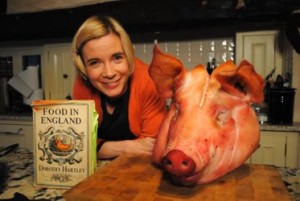
‘Food in England, The Lost World of Dorothy Hartley’, BBC Four, November 2012
‘Food in England, The Lost World of Dorothy Hartley’ is a new BBC4 film to be shown at 9pm on Tuesday 6th November 2012. It tells the story of the woman behind ‘Food in England’, the gigantic compendium published in 1954 on the history of British cooking by Dorothy Hartley. I’d long been a fan of its crazy, exuberant mixture of history, geography, anthropology, folklore and even magic, but until this project, I didn’t realise what an accurate picture it painted of a lost Britain of the 1930s, when much of the research was done. Nor did I realise what a magnificently eccentric woman Dorothy Hartley was, an author who devoted her whole life to the history of food. Read much more about the film here.
-
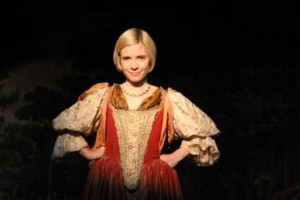
Harlots, Housewives and Heroines, BBC Four series, May 2012
The seventeenth century was where I started out as a historian, and my PhD was about King Charles II’s tutor. It was the Duke of Newcastle who taught the Merry Monarch how to enjoy women’s brains as well as their bodies, and this series examines the new opportunities that the 1660s for women. We covered the royal ‘harlots’ or mistresses at court and the everyday ‘housewives’ in ordinary homes all over the country. The final episode looked at my ‘heroines’: the memorable, admirable and inspirational female pioneers as the first professional actresses, spies, writers, explorers and scientists. Read more about the series here.
-
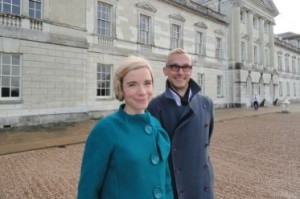
Antiques Uncovered, BBC Two series, May 2012
Antiques … what do we really know about them? Often we don’t look much beyond their surface beauty, apart from maybe questioning their value. Some antiques started life as purely practical objects, while others were for decoration and the expression of wealth. But whether they’re from a stately home or a two up and two down, they unlock a fascinating history of the way we lived then and now.
In Antiques Uncovered, historian Dr Lucy Worsley uncovers the stories behind some of these remarkable objects and how they relate to our lives today. Antiques expert Mark Hill looks at why some items have become priceless, while others are waiting in the wings to become the collectables of tomorrow. This three-part series was shown on BBC 2 in May 2012.
-
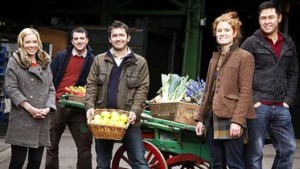
Our Food, BBC Two series, April 2012
Giles Coren embarks on a journey across Britain to discover how our landscape, history and climate shape what we grow and where we grow it. Giles and the team start in Norfolk, a county where local, seasonal foods are just as important as large-scale commercial farming. Giles learns to tell the difference between a male and female crab when he gets a taste of life as a Cromer fisherman, while Lucy Worsley uncovers the Mexican past of our traditional Christmas turkey. Other episodes feature North Wales, Kent and Scotland. Presented by Giles Coren with James Wong, Lucy Worsley, Alex Langlands and Alys Fowler. Watch the trailer here, and see the amusing burping turkey here.
-
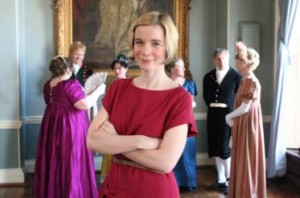
Elegance and Decadence, The Age of the Regency, BBC Four series, September 2011
This lovely three-part series, made for BBC4 by BBC Bristol, and shown in September 2011, marked the 200th anniversary of the start of the Regency period. I was proud to be nominated for this project in the category of ‘best female onscreen talent’ in the Royal Television Society’s West of England awards 2012.




